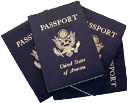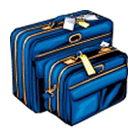Links to Remember
Packing
A little bit of research will go a long way. If you find out what the weather will be like where you will be studying in Austria, you can plan ahead and save yourself the hassle and expense of possibly having to buy a whole new wardrobe in Austria. On–line research is one of the easiest ways to discover what the weather is like in Austria. (Please see "Weather" in the Resources section of this Handbook for some helpful links.) Ask yourself: How will climate and weather affect my travel plans and activities? Will I need to bring an umbrella, swimsuit, or both?
Students who have studied abroad suggest packing certain items in a carry–on, and putting other items in checked baggage. Below are a few recommendations of what to pack where, what to leave behind, and what to buy when you get there:
1. Carry–on Luggage
A note about carry–on items: Most commercial airlines now have new regulations regarding what you can and cannot pack in your carry–on luggage. Sharp items like razors, knives, and nail files are banned in carry–on luggage on most flights. For more information, please see the Duties, Customs, and Airport Security section of this Handbook.
In general, there are some very important items you will NOT want to pack in your checked baggage; rather, you will want to have them handy at all times and packed in your carry–on bag. These items are:
- Passport

- Visa
- Tickets
- Prescription medicine
- Glasses
- Money (For taxi rides to and from airports, phone calls, emergencies, etc...)
- Other official documentation
You may also want to have a few personal items in your carry–on in order to make your trip more comfortable and enjoyable. Consider including items like a water bottle, a book, a toothbrush/toothpaste and a change of clothes and underwear in case of flight delay/cancellation.
2. Checked Baggage
Less is more. Although just about everyone will caution you to pack light, packing can be a very personal process. Packing can be especially challenging if you plan to stay abroad for a relatively long time. You want to have as many comforts in Austria as you have at home, yet you know you can't bring everything with you. Also, part of the reason you are going abroad is to get out of your comfort zone and away from home; therefore, you will have to prepare to make do with fewer things.
 Not only does your airline have a baggage limit, but also you will have a space limit at your residence in Austria. When you travel, you probably won't want to lug around, or pay to store, all the stuff you've brought with you. You are most likely going to acquire things in Austria, including souvenirs, clothes, gifts, etc... You will need some extra packing space in order to fit in these newly acquired items.
Not only does your airline have a baggage limit, but also you will have a space limit at your residence in Austria. When you travel, you probably won't want to lug around, or pay to store, all the stuff you've brought with you. You are most likely going to acquire things in Austria, including souvenirs, clothes, gifts, etc... You will need some extra packing space in order to fit in these newly acquired items.
Don't be a packing procrastinator. Packing for a semester abroad in Austria a couple hours before your flight just isn't a smart idea. Packing takes planning, and you will most likely pack and re–pack a number of times before you're satisfied (and before you can cram everything into your bags so they shut properly!)
3. Other Things to Bring
 In addition to the regular necessities like underwear, clothes and shoes, you may also need a few other things. The following is a list of items you may not have thought you needed or wanted to take with you. See if you forgot to pack any of the following:
In addition to the regular necessities like underwear, clothes and shoes, you may also need a few other things. The following is a list of items you may not have thought you needed or wanted to take with you. See if you forgot to pack any of the following:
- Proof of Insurance
- Doctor's Note (proving you're free from certain diseases; may be required for entry into Austria)
- Student I.D. Card (good for discounts too)
- Money Belt
- Backpack (for class and for day–trips)
- Sleeping Bag (for camping or hostel stays)
- Pocket Knife (don't put this in your carry–on!)
- Camera/Journal
- Prescriptions (translated)
- A Few Family Photos (so you don't get homesick)
- Dress set of clothes (just in case you go somewhere fancy)
- Gift (it may be appropriate to bring your host family a simple gift from home)
- An inventory list of the items you packed in your checked baggage, in case you need to make an insurance claim on lost luggage
- Identification tags with your contact information on them, attached both outside and inside your checked bags and carry–on bags
4. What to Buy When You Get There
Not having to worry about certain items spilling or breaking, and not packing certain items saves space. You could buy many inexpensive items when you arrive in Austria rather than pack them. Consider buying items like shampoo, soap, sheets, towels, an umbrella and film in Austria.
5. Ship Over or Ship Back
 When and how you might decide to ship:
When and how you might decide to ship:
- If you just can't manage to pack light, or there's something you just can't live without but doesn't fit in your suitcase, consider shipping it.
- If you have a physical disability or ailment like a bad back, you may not be able to carry heavy luggage through airports. In this case, shipping your items to your residence in Austria might be a better option for you.
- If you forget something you really need, you could have a friend or family member ship you whatever necessary item you left at home in the United States. However, ask yourself if you really need the item, if it's worth the cost of shipping it, or if you might be able to buy a similar item in Austria to replace it.
- During your time in Austria, you may have purchased several new items, souvenirs, gifts, etc., or you just might not be able to pack as well for your return home as you did the first time. You may want to ship souvenirs or excess clothing home.
- Make sure to get shipping insurance in case the worst happens and your boxes never arrive, or arrive damaged. This applies whether you are shipping to or from Austria.
- Make sure there is someone at your place of residence in Austria who is willing and able to claim the boxes you have shipped ahead. If no one signs for, or picks up, your shipped goods, they may be returned to you in the United States. Also, make sure there is someone at your place of residence in the United States who can claim any items you ship home.
When to consider other options besides shipping:
- Your airline may charge less to let you check your excess, heavy baggage than it would cost to ship your excess baggage.
- If your boxes have to pass through customs, or be opened–up and inspected by customs officials, this may delay their delivery even further. There is also a chance that customs officials may prohibit their delivery if you have packed any items in violation of customs regulations; make sure not to pack anything against the customs regulations of both the United States and Austria.
- If you're in a hurry, shipping might not be the best idea. In addition to the expense, shipping can also be slow. Plan ahead because shipping may take more than six weeks for everything to arrive.
6. What to Leave Behind or Donate
 There are people in need everywhere in the world. Donation is an excellent way to get rid of items you don't need anymore and ones that won't fit in your suitcase, reduce the costs of having to ship items homes, or having to pay for excess baggage.
There are people in need everywhere in the world. Donation is an excellent way to get rid of items you don't need anymore and ones that won't fit in your suitcase, reduce the costs of having to ship items homes, or having to pay for excess baggage.
Just because you can't fit something in your suitcase, or don't want something anymore, doesn't mean that it can't be of use to someone else. Donation is a great alternative becoming more and more popular with students who study abroad because students know they can do a good deed, support a good cause, or help someone in need.
It's easy to find out where to donate your items in Austria; ask your program administrator, residence hall/dorm advisor, the local hospital staff or a local resident of the community. You may not even have to bring the items to a donation site. Your program administrator or residence hall/dorm advisor might be willing to take care of it for you. Ask them to organize a donation day so that the other students in your program can participate also. Everyone else in your program will probably have something they want to give away as well. In addition to donating to the poor in Austria, you may be able to give some of the items you don't need anymore to your fellow students who will remain in Austria.
Possible donation items include books and school supplies, clothes and shoes, sheets, blankets, towels, umbrellas, kitchenware, and food.
7. Relevant Questions
- Have you researched the weather conditions over various seasons in the region of the country of your choice where you will be?
- Did you remember to pack all important travel documents in your carry–on, not your checked bags?
- Have you considered which, and made a list of, items not to take because you can buy them when you get there?
- Have you packed as lightly as possible, remembering to roll instead of fold your clothes?
- Did you make an itemized list of everything you packed in your suitcases in case they are lost or stolen and you need to make an insurance claim?
- Do you know how much luggage your airline allows you to check and to take on board your flight?
- What are you planning to ship, and is it cheaper to pay for excess airline baggage rather than ship?
- If you have decided to ship some items, who have you contacted in the country of your choice to insure pick–up and/or payment for these items upon arrival?
8. Checklist
- I know how much luggage my airline allows me to check and to take on board my flight.
- I know what my airline permits me to carry in my carry–ons.
- I have researched the weather conditions over various seasons in the region of the country of your choice where I will be.
- I remembered to pack all important travel documents in my carry–on, not my checked bags.
- I made a list of items I intend to purchase once I arrive in the country of your choice, rather than pack them.
- I made an itemized list of everything I packed in my suitcases in case they are lost or stolen and I need to make an insurance claim.
- If I have decided to ship some items, I have contacted someone in the country of your choice to insure pick–up and/or payment for these items upon arrival.
9. Resources
- AllAbroad.us – Packing: Mentors suggest how much to pack for studying abroad.
- American Express Travelers' Cheques Buy Travelers Checks online and learn more about other travel cash solutions.
- StudyAbroad.com Handbook Prescriptions Summary recommendations for dealing with prescription medications abroad.




 Austria
Austria


